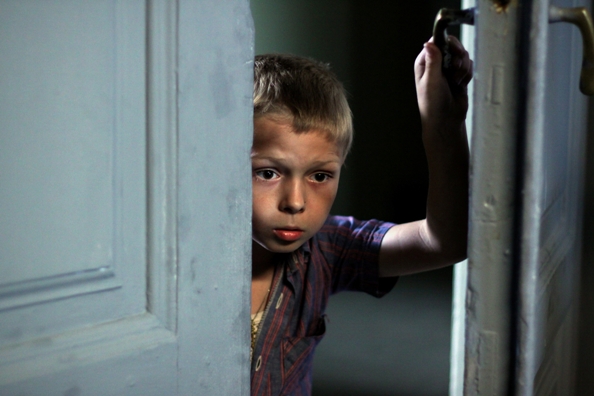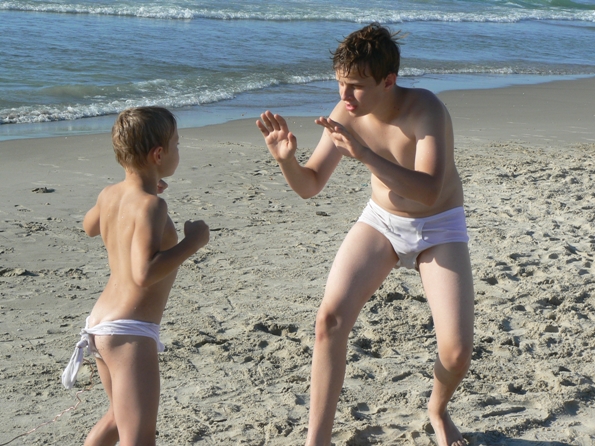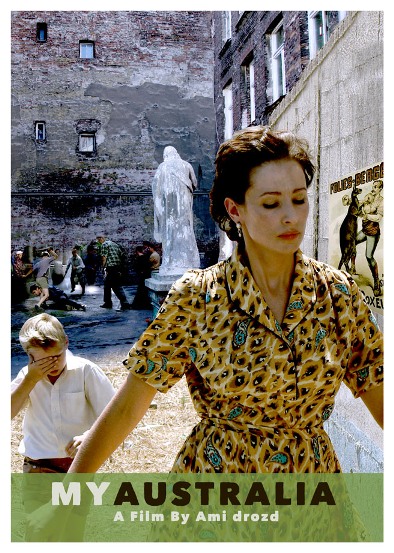The upper floor of an apartment building hides a secret world tied to a rope – Australia – waiting to be animated by the voice and imagination of a boy, Tadek (Jakub Wróblewski). Yet soon after he pulls the model out of its niche, a whistle calls him out to join his older brother Andrzej (Lukasz Sikora) and the neighborhood gang to beat up Jews. Although the animals in Tadek’s Australia are busy beating up on one another there is a childlike innocence to the opening scene; soon shattered by the brutal violence that follows.
My Australia, by Ami Drozd, is a powerful and immensely appealing film that not only engages with difficult topics – post-war anti-Semitism in Poland and neo-Nazism, Jews who remained in Poland after WWII, Jews who chose to hide their origins and live as Christians – but gives voice to those who are not usually heard in the Israeli cultural discourse. Living in a poor neighborhood in Poland of the 1960s, Tadek is tethered between worlds, each pulling him in a different direction: childhood and adolescence, his creative inner emotional world and the external world of harsh necessity, Pole and Jew. Street smart and achingly sensitive, creative, determined, cheerful and mercurial, the film follows Tadek closely, presenting these conflicting worlds from his perspective, one of boundless curiosity and intelligence trying to cope with incomplete and often misleading information.
Tadek knows what it takes to survive in his environment. When he and Andrzej are arrested along with the other gang members, he listens in on his mother’s (Aleksandra Popławska) conversation with the police officer, admiring her invention of a war hero husband (who received every military medal possible) to get the boys out of trouble. It’s a world where you do whatever has to be done – lie, cheat, steal, fight – and Tadek does it well. Collecting bottles to redeem for cash, he agrees to “trade” his bill for an older boy’s coins, then runs off with all the money. It’s not a pretty picture, but Tadek is so appealing, energetic, joyous and despite his streetwise actions, and so innocent, that one cannot help but empathize with the aspiring hooligan. After bringing the boys home from jail, when the mother asks, somewhat incredulously, “You went to beat up Jews?” Tadek looks up at her and nods, shining with excitement, happily unaware that there might be anything wrong in his actions.
Yet everything that Tadek knows is about to be undermined. His inventive mother, having survived the Holocaust, decided that it would be better to hide her Jewish origins and live as a Catholic, raising her sons by a Polish father – both literally and figuratively out of the picture – without knowledge of her past. Seeing the outcome of this decision, she decides to change course, yet still tries to smooth the way with a good story. Taking Andrzej into her confidence, she delegates the job of informing Tadek to the 15 year old.
When Andrzej tries to tiptoe towards the truth by telling Tadek that their Uncle Felix is a Jew, Tadek’s reaction is immediate and direct: “How did that happen to him? Fuck…”
What has been a convenient cover story for the mother has serious meaning for her sons; it is their entire world, their life, their identity. Raised as a Catholic Pole, influenced by the norms of an anti-Semitic environment, Tadek’s every thought and emotion comes from within that set of beliefs. Believing that Jews are loathsome creatures to be despised and hated, it is not only his system of beliefs that has been put in question, but his sense of self. Yet Tadek’s carefully constructed “Australia” suggests that there was always a desire to be elsewhere, to find refuge in an imaginary world, somewhere far away, different, exotic; a place with the freedom to create, to be different, to be someone other than the Tadek of the streets.
Once the mother realizes that she needs to get her sons away from their current environment, Tadek’s compliance is enlisted by telling him that the family will be moving to the land of his dreams – Australia. Once on the boat however, it turns out “there’s a slight change of plans…but it’s exactly like Australia.” Tadek is outraged: “It’s not enough that we’re sort of Jews, now we’re going to live in their country.”
The film explores the concepts of family, home and identity with sensitivity and humor through Tadek’s adventures. The childlike perspective takes the edge off some of the harsher elements, yet these are presented in a simple, direct manner – whether it’s the hostility of the Israeli children towards Tadek, or his own beliefs about these “weird people not ashamed to be Jewish.” Once in Israel, Tadek never misses a beat and runs headlong into his new life, helping his mother with Hebrew pronunciation, and doing everything he can to fit in with the group after his mother sends the boys to live on a kibbutz.
While Tadek desperately wants to be accepted, Andrzej remains resolutely an outsider – the boys’ stories raising questions of identity, loyalty, and the individual in relation to the group. This story is one that has not often been told in Israeli cinema, the story of the post-war generation born in Europe, and their relationship to Jewish and Israeli identity. In the internal contradiction of Tadek’s life, the desire to belong involves sacrifice, literally and symbolically letting go – not only of the past and the outward aspects of a former life – but the essence, the most private core of his being.
Drozd explores an important and often neglected chapter in Jewish/Israeli history with sensitivity and a wonderful sense of fun, creating memorable characters – most notably Tadek in a captivating performance by Jakub Wróblewski, and a strong sense of place. Premiering at the Jerusalem Film Festival 2011, My Australia received the Van Leer Group Foundation Audience Choice Award.
Now showing at the Tel Aviv Cinematheque, check the website for dates and times.
My Australia (Israel 2011, 96 min, Polish & Hebrew, English subtitles)
Directed by Ami Drozd; Produced by Marek Rosenbaum, Itai Tamir, Michael Rozenbaum, Dariusz Jablonski, Violetta Kaminska, Izabela Wojcikl; Screenplay and Editing – Ami Drozd; Cinematography – Adam Sikora; Editing – Haim Tabakman; Original Score – Ofir Leibovitz and Janusz Stoklosa. Transfax Film Production, Israel; Apple Film Production, Poland. The film is supported by The Polish Film Institute and the Cinema Project, a joint project of The Rabinovich Foundation For The Arts & The Recanati Foundation.










I work for a Jewish Community Center. We would like to obtain the film for showing in our Sunday Cinema series. Do you have the contact for the distributor?
It sounds as if this film was based on real life people and events. Hope to see it in the future or purchase the DVD.
My Australia will be released in theatres internationally, however as the film has just premiered at the Jerusalem Film Festival, there are no dates set as yet. Midnight East will report on screening dates in the US, Australia and other countries as soon as the information is available.
will it be coming to Australia ?
Will this film be coming to the states any time in the near future
Comments are closed.